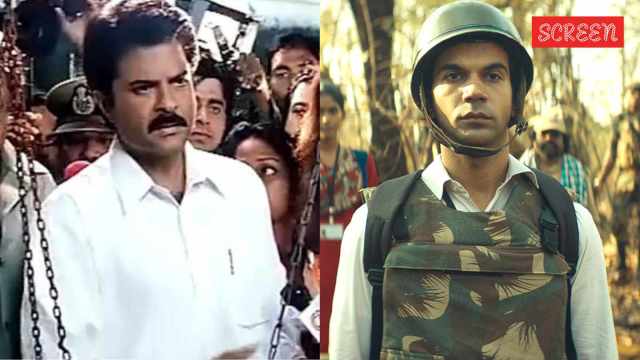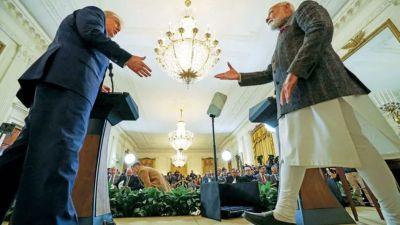Click here to follow Screen Digital on YouTube and stay updated with the latest from the world of cinema.
25 years of fearless cinema: From Nayak to Newton, films that ditched chest-thumping for truth and change
In recent years, our stories have grown self-congratulatory, celebrating triumphs while avoiding reflection. This Independence Day, we spotlight films that dared to confront uncomfortable truths, challenging and provoking change without fear.
 Newton to Nayak: This Independence Day, we spotlight films that dared to confront uncomfortable truths.
Newton to Nayak: This Independence Day, we spotlight films that dared to confront uncomfortable truths. We have all seen Hrithik Roshan’s bulging biceps in the War 2 trailer. The film, which released on August 14, timed its arrival with Independence Day to showcase the “valor” of an Indian soldier who stands against enemy forces — here played by Jr NTR. But this isn’t a new template. In recent years, nationalist films have frequently walked the thin line between patriotism and jingoism, often spreading propaganda designed to sway public sentiment.
These films may parade bravery on screen, but in truth, they aren’t brave at all. Real courage in cinema comes from questioning the prevailing rhetoric, not from endorsing it to secure box office numbers. As John Abraham aptly put it in a recent interview, “What is worrying to me is that right-wing films find a huge audience and that’s when you ask yourself as a filmmaker what line will you toe – the commercial one or the one where you stay true to what you want to say?”
In the past few years, our narratives have become self-congratulatory, fixated on celebrating achievements without room for reflection. True bravery, especially in today’s climate, also lies in acknowledging flaws, addressing uncomfortable truths, and allowing such stories to be told without fear. This Independence Day, we turn our attention to films that dared to hold a mirror to society — not to demean, but to challenge, provoke, and push for change.
Nayak (2001)
I first watched Nayak as a child, and it has lived rent-free in my mind ever since. Why? Because it explored an idea that felt both thrilling and empowering—imagine getting the reins, even for just one day, to govern the very city where you witness civic failures and social problems every day, problems you usually feel helpless to change, not to mention the blatant corruption that has become a part of everyday life.
At the time, Nayak was a fascinating premise, brought to life by the magnetic presence of Anil Kapoor and Amrish Puri. Backed by AR Rahman’s powerful soundtrack, the film created an atmosphere of pride and power — emotions that the average middle-class Indian rarely gets to experience outside the world of cinema.
Lakshya (2004)
When we talk about portraying the bravery of Indian soldiers on screen, we often overlook the human being behind the uniform — their journey, struggles, and transformation. Too often, actors play soldiers as if they’re in a high-octane video game, designed purely for audience thrills.
Farhan Akhtar’s Lakshya broke away from that mould. It offered an extraordinary coming-of-age story that didn’t rely on gravity-defying stunts but on authentic bravery — charting Hrithik Roshan’s transformation from a privileged, aimless young man into a soldier whose life and choices, directly impact the nation. His mission to scale the heights and eliminate the enemy wasn’t just physical — it was symbolic of his personal growth. There’s no chest-thumping patriotism here. Instead, the narrative is rooted in reality, empathy, and respect for the man behind the uniform.
 Hrithik Roshan in a still from Lakshya.
Hrithik Roshan in a still from Lakshya.
Sehar (2005)
Thanks to Rohit Shetty’s cop universe, police dramas in Bollywood found a new life — full of style, swagger, and high-octane action. But while those films excel in entertainment, they rarely leave a lasting social impact.
Sehar, starring Arshad Warsi, is a very different kind of cop story — quiet, realistic, and deeply resonant even years after its release. Arshad plays a committed, disciplined officer who shoulders the weight of a corrupt system, pushing against it in silence while fulfilling his duty. There’s no grandstanding or loud declarations of honesty and bravery—he simply does his job, and never looks back.
A Wednesday (2008)
The brilliance of Neeraj Pandey’s A Wednesday lies in its refusal to draw clean lines between right and wrong. By giving us the backstory of its so-called villain-turned-hero (played masterfully by Naseeruddin Shah), the film blurs moral boundaries and forces us to confront uncomfortable questions. Frustrated by a weak and indifferent system, this ordinary man takes matters into his own hands, risking his life to “clean” society.
In many ways, the premise echoes Nayak—a common man stepping in where the system has failed. But here, the stakes are higher and the tone grittier. The narrative addresses religious violence, corruption, and the way systemic failures inevitably crush the common man, leaving him helpless and angry. It’s a sharp reflection of public angst.
 A still from A Wednesday.
A still from A Wednesday.
Gulaal (2009)
There are certain films you know wouldn’t see the light of day if they were released today, and Anurag Kashyap’s Gulaal is one of them. The film is less a political drama and more a raw, unflinching dive into the underbelly of student politics, caste privilege, and the hunger for power. Set against the backdrop of a fictional Rajputana movement, it lays bare how ideology can be weaponised and how the quest for power is often disguised as a fight for justice. Hard-hitting and unapologetic, Gulaal is as much an eye-opener as it is a mirror to the darker truths of society.
Peepli Live (2010)
Before Panchayat’s Pradhan ji (Raghubir Yadav) gave us the feel-good side of village life, he showed us its harsh, unforgiving reality in Kiran Rao’s directorial debut Peepli Live. The film tackles the deeply sensitive issue of farmers’ suicides, yet wraps it in biting satire that makes you laugh even as it unsettles you. It’s one of those rare gems that presents a heartbreaking subject without burdening the audience, while still ensuring they never forget the plight of farmers. In this theatre of life, farmer Natha (Omkar Das Manikpuri) decides to end his life so his family can claim government compensation — a personal tragedy that snowballs into a grotesque political spectacle. It heartwarming and heartbreaking in equal measure and shouldn’t be missed.
 A still from Peepli Live.
A still from Peepli Live.
Newton (2017)
At a time when the country’s Election Commission often finds itself under scrutiny, Rajkummar Rao’s Newton feels more relevant than ever. The film takes us deep into the machinery of Indian elections, revealing the countless people, efforts, and dangers involved in keeping democracy alive. These are not soldiers or trained combatants — just ordinary citizens shouldering an extraordinary responsibility. At its heart, the film is also a reflection on honesty. As Sanjay Mishra’s character tells Newton, “Your arrogance about your honesty… your honesty is not doing the world a favour; it is expected of you.”
Bheed (2023)
Rajkummar Rao delivers yet another hard-hitting performance in Anubhav Sinha’s Bheed, a stark black-and-white drama that fearlessly revisits one of the darkest chapters of recent history — the mass migration during the 2020 COVID-19 lockdown, the largest in India since Partition. Drawing from true events, the film lays bare the cracks in governance, exposing how caste politics, religious prejudice, and systemic apathy collided in a moment of national crisis. In an atmosphere thick with fear and uncertainty, we see people walking hundreds of kilometres, some dying in packed trains, others stranded without food or shelter, something that isn’t fictional but was the reality faced by many in the country.
Special mention
Many other films in Hindi cinema have dared to challenge the set, comfortable narratives and question authority. Like the 2010 film Aakrosh addressed caste discrimination, honour killings, and deep-seated corruption. Rajkummar Rao’s Shahid (2012) told the true story of a Muslim man’s redemption after being drawn into a terrorist organisation, following his journey as he fights legal battles for others wrongfully accused. John Abraham’s Madras Cafe (2013) explored the Tamil genocide in Sri Lanka and the political failure of the Indian Peace Keeping Force. Ayushmann Khurrana’s Article 15 (2019) also gives a haunting view of the caste discrimination and the brunt of the prejudice faced especially by the women of the marginalised communities.
Photos
- 01
- 02
- 03
- 04
- 05

































